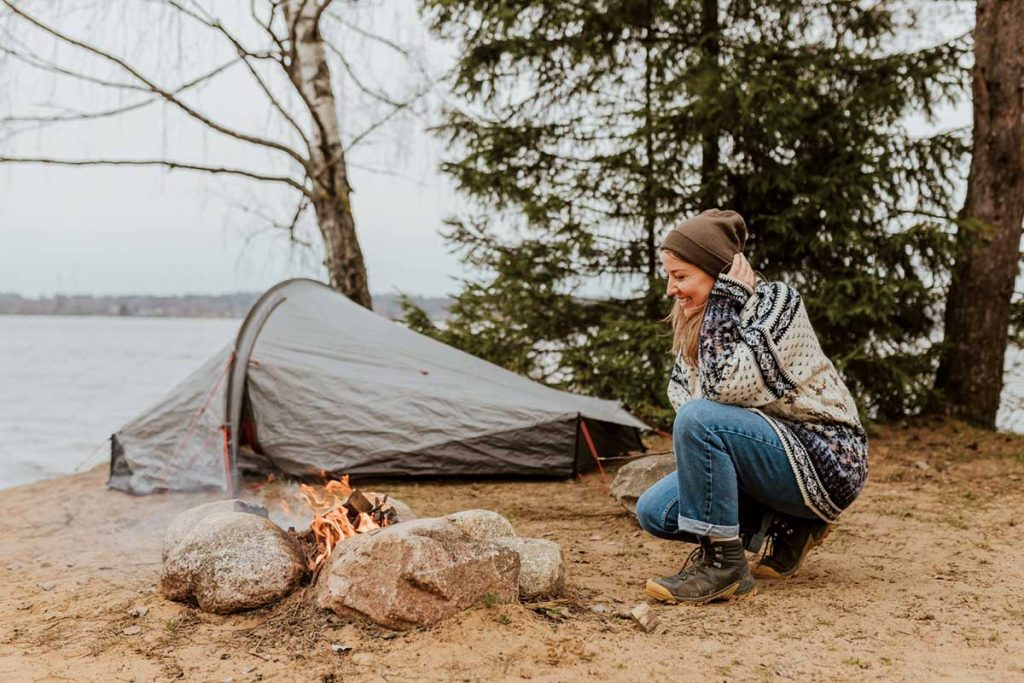
Sunny skies, soft summer breezes, and dips into the lake are likely the first things to pop into your head when you think of camping.
Still, as summer bids us farewell and makes way for fall, don’t pack up your outdoor equipment just yet. According to the Kampgrounds of America, an increasing number of people are planning to tent out during the cooler months and there are many reasons you should as well.
Outdoor advantages
When the winter blues set in, nature can prove to be one of the best medicines. For people living in the northern latitudes, days are short; low mood and energy are common. With the seasonal shifts, some people’s mental health begins to degrade as well.
To alleviate these symptoms, we must take advantage of the daylight we do receive. Physical activity and closeness to nature has a positive impact on both the mind and body. This fact remains unchanged during the winter months, so staying active outdoors can be of huge benefit to your well-being. While bundling up with a blanket and a good book is a must during winter, it is equally as important to brace for the cold and head outside.
What is SAD?
Commonly known as the winter blues, seasonal affective disorder (SAD) is a condition that causes biological and emotional disturbances to occur regularly during the winter months. The seasonal changes in light and its effect on circadian rhythm and melatonin secretion contribute towards SAD.
Treatments for SAD include light therapy, antidepressants, cognitive behavior therapy, and vitamin D supplements. However, it doesn’t have to begin or end there. The sun provides natural vitamin D and spending time in nature can help decrease depression symptoms and psychological distress.
Luckily, hardcore camping isn’t necessary to reap these benefits. Fresh air and a walk in nature is plenty. If you do wish to tent out for a day or two, remember to pack a light and a heat source. Either way, it’s also important to prepare your body for the colder temperatures.
Supplements for SAD
No supplement will fully negate the effects of SAD, but there are some that may better equip your body to deal with it:
- B vitamins, such as folic acid and vitamin B6, help regulate mood. A B vitamins deficiency can lead to depression.
- SAD is often linked to a deficiency in vitamin D, so taking this as a supplement can also help.
- Melatonin may encourage a good night’s sleep that you might not get otherwise.
- St. John’s Wort, an herbal remedy, is known to help with mood disorders.
- Fish oils that contain omega-3 fatty acids may help maintain emotional balance.
Please consult a healthcare practitioner before deciding to take any of these supplements.
Cold-weather skincare
The dry, cold winds can negatively impact skin and worsen existing skin conditions such as psoriasis and eczema.
Unfortunately, there are no magical solutions for preventing dry skin during winter. The methods are tried and true: moisturize thoroughly, stay hydrated, limit shower times, pat skin dry gently, and use humidifiers at home.
Some dermatologists also recommend using moisturizing face cleansers that come in the form of creams, oils, and balms. Plus, don’t forget sunscreen: even if you can’t see the sun, the sun can still see you!
Of course, it’s hardly realistic to pack all these products up with your camping kit, but the basics like moisturizer and sunscreen are a must. A balaclava or face mask can also be used to shield your face from the wind.
Hair help
Hair also needs protection from the harsh winter conditions. Oiling hair and then loosely braiding it is one potential way to prevent dry and tangled hair while outdoors. Covering it with a scarf altogether is also a good idea.
While at home, consider using hair masks to keep your hair hydrated. Avoid going outside with wet hair as this can cause breakage, and always handle your hair with gentleness and care. Experts recommend adding iron, vitamin D, vitamin C, and biotin to your diet to help maintain hair health.
Sweet dreams
Here are a few things you can do to improve your quality of sleep while camping:
- Wind down before bedtime by meditating or listening to nature or music.
- Drink a sleepy-time tea before bed.
- Put on ear plugs and bug spray.
- Pack well-insulated sleeping gear and warm clothes.
- Wear gloves, socks, and even a beanie, if needed.
- Bring a comfy pillow.
- Don’t stay up too late, as tempting as it might be.
Not too little; not too much!
Research reveals that sleeping for a short or a long period of time can increase risk of depression. You will have to figure out what an adequate amount of sleep looks like for you, as it can be different for each person.
This article was originally published in the November 2024 issue of delicious living magazine.